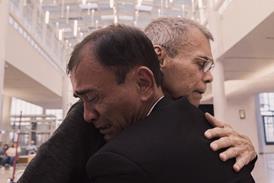Dir: Lee Chang-dong. S Kor. 2007. 133mins.
An uncompromising experiment in how much suffering a soul can take, both on screen and in one's cinema seat, Lee Chang-dong's follow-up to the critically-acclaimed Oasis makes for an original but ultimately gruelling two-and-a-quarter hours' viewing.
This contemporary, twisted parable of Job is impressive, intriguing and frustrating in more or less equal measure. Starting off in the key of romance, shifting into thriller mode and ending as a full-on tragedy (but without the catharsis) the film is given cohesion by Jeon Do-yeon's powerful Palme d'Or-winning performance as a woman unhinged by grief.
But Lee's flouting of genre and script-structure conventions ultimately feels a little self-indulgent: we end up resenting the fact that the director's obsession with his central character leads him to ignore the needs of his audience, and to stretch the film out to a length that is never really justified by the story.
Oasis was hardly a fairground ride, but it did provide an emotional uplift denied by the bleaker Secret Sunshine, which may frighten off distributors in several of the territories that snapped up that earlier gem.
The presence of Host star Song Kang-ho is a false commercial bait, as Song takes a subdued, backseat role here. But dedicated collectors of South Korean titles will still want to see this, and the film's sheer originality will no doubt persuade some niche distributors to take a chance on it.
Opening in Korea on May 24, Secret Sunshine will test the stamina of the resilient home crowd. Diaphana has picked up the title for France, where the Palme d'Or label on the poster will give it a smallish leg-up.
The story centres on Lee Shin-ae (Jeon Do-yeon), a tiny, fragile but determined single mother who decides to move to her husband's hometown of Miryang after his death in a car crash. Here she takes in piano students, sends her young son to the local primary school and rebuffs the advances of shambling mechanic Kim Jong-chan (Song Kang-ho), who has conceived an inarticulate but remarkably tenacious crush on the young widow.
Right from the get-go we sense that there are disturbing, unstable currents beneath the proud self- sufficiency that Shin-ae projects. When her brother mentions her late husband's many affairs, she simply denies them; and her boast that she is about to buy a plot of land turns out to be a story invented to make her seem more important.
It is this pretence of wealth that provides the catalyst for a shocking development around a third of the way in. From this point on, what had appeared to be a rambling, alternative rom-com full of sharp emotional observations veers into much darker water.
A police investigation initially suggests that Secret Sunshine might be shaping up to be a thriller, possibly laced with a revenge theme a la Sympathy For Mr Vengeance; but the case is quickly, and brutally, resolved, and from here on in the focus is firmly on Shin-ae as she begins to unravel - first seeking help from a born-again Christian group, then turning savagely against God.
Starting off as a sort of Korean Alice Doesn't Live Here Any More, the film eventually turns into an unflinching, Bressonian study of grief, while its theme of a woman's desperate, self-imposed anti-martyrdom in a smalltown setting carries echoes of Breaking The Waves.
Jeon Do-yeon gives an astonishingly authentic performance as Shin-ae: without her, the film would fall apart under the strain of its overloaded ambitions. Song Kang-ho is a good foil: his laddish but lonely character functions as a reality check when things are getting too heavy, and injects humour into the mix even at the darkest moments.
Photography is limpid and light-filled, presenting the town of Miryang (whose name, we are told, means 'secret sunshine') mostly in the bright light of day, playing against Sin-ae's inner torment to show life going on around her with sunny indifference.
Christian Brasso''s score performs a similar task at times - especially at the film's darkest moment, when the classical string instrumentation is much jauntier than the situation would seem to warrant.
Production companies/backers
Pine House Film
Cinema Service
CJ Entertainment
International sales
CJ Entertainment
Producer
Hanna Lee
Executive producers
Kim In-soo
Lee Chang-dong
Screenplay
Lee Chang-dong from an original story by Yi Chong-jun
Cinematography
Cho Yong-kyu
Production design
Sihn Jeom-hui
Editor
Kim Hyun
Music
Christian Brasso
Main cast
Jeon Do-yeon
Song Kang-ho





















No comments yet